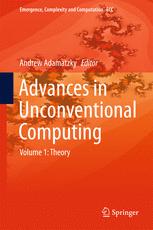

Most ebook files are in PDF format, so you can easily read them using various software such as Foxit Reader or directly on the Google Chrome browser.
Some ebook files are released by publishers in other formats such as .awz, .mobi, .epub, .fb2, etc. You may need to install specific software to read these formats on mobile/PC, such as Calibre.
Please read the tutorial at this link: https://ebookbell.com/faq
We offer FREE conversion to the popular formats you request; however, this may take some time. Therefore, right after payment, please email us, and we will try to provide the service as quickly as possible.
For some exceptional file formats or broken links (if any), please refrain from opening any disputes. Instead, email us first, and we will try to assist within a maximum of 6 hours.
EbookBell Team

0.0
0 reviewsThe unconventional computing is a niche for interdisciplinary science, cross-bred of computer science, physics, mathematics, chemistry, electronic engineering, biology, material science and nanotechnology. The aims of this book are to uncover and exploit principles and mechanisms of information processing in and functional properties of physical, chemical and living systems to develop efficient algorithms, design optimal architectures and manufacture working prototypes of future and emergent computing devices.
This first volume presents theoretical foundations of the future and emergent computing paradigms and architectures. The topics covered are computability, (non-)universality and complexity of computation; physics of computation, analog and quantum computing; reversible and asynchronous devices; cellular automata and other mathematical machines; P-systems and cellular computing; infinity and spatial computation; chemical and reservoir computing.
The book is the encyclopedia, the first ever complete authoritative account, of the theoretical and experimental findings in the unconventional computing written by the world leaders in the field. All chapters are self-contains, no specialist background is required to appreciate ideas, findings, constructs and designs presented. This treatise in unconventional computing appeals to readers from all walks of life, from high-school pupils to university professors, from mathematicians, computers scientists and engineers to chemists and biologists.